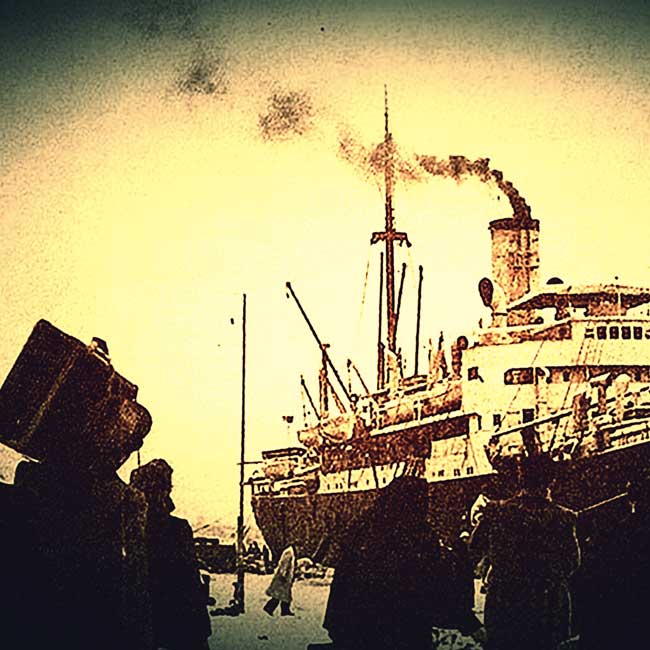Songs about emigration

The emigrant is one of the most widely-evoked figures in Italian song lyrics, in the moment of farewell as well as that of his return, when he is full of the hope for the future that awaits him or filled with nostalgia for the land he left behind (…). Every city in Italy, large or small, has had its emigrants, and there are many songs to remember them, often in different idioms, but with widespread and shared feelings. “Ciao Turin.. mi vadô via / vadd lôntan a travajé / mi sai nén cosa ca sia / sentô ‘l coeru a tramôlé” sings one who leaves la Mole, and a Florentine returning is asked “La porti un bacione a Firenze / che l’è la mia città / ma in cuor l’ho sempre qui / la porti un bacione a Firenze / io vivo solo per rivederla un dì”.
The old Genoese emigrant sitting on a bollard in Boca, the port of Buenos Aires, facing the departing steamship, says with his all soul “Ciao, salutime un po’ Zena […] / ti l’ambrassi e ti ghe dixi no l’ò / mai ciù ascordae”, and on the train that goes from Bari to Milan, a thought about the sea: “O Pescara nel tuo bel mar / si specchiava un raggio lunar / O Pescara il tuo bel mar / non lo potrò dimenticar”. Collected this way are the thoughts of emigrants from Trieste, Brindisi, of course Naples and even Marano Vicentino: “Mio caro paesino […] / in questo ritornello / ti dico che sei bello / più caro al mondo non ce n’è” which, although small, had many, many emigrants. All rhetorical? Sometimes! But the fact is that everyone really carried within him that little piece of the hometown in which he was born and raised. They knew very little outside their own homelands and consequently, on this wavelength, the emotions ran strong.
After the land come the people: the mother, the girlfriend, at times the entire family, and on these themes the “commercial” song, although often in tune with the different regional popular repertoires, tends to replace drama with melodrama. “Buon compleanno mamma / io bacio la tua fronte / e voglio farmi forte / per non piangere pensando a te”. In some cases, the dramatic story reaches great heights of expression, thanks also to traditional music such as, for example, Lacreme Napulitane.
However, the tendency is often to make the lyrics a pretext for arousing ancestral emotions and, in cases like these, also with appreciable compositions written by the best musicians, one can easily fall into clichés or worse, into ideological propaganda […].
Original songs place a special focus on the themes of emigration from the south to the north, from Italy to Europe and on world routes, particularly in the years after the Second World War, describing a reality found every day in the neighbourhoods of our country […]. With Non piangere Maria, Domenico Modugno put forward the name that would identify the female emigrants.
“Il treno che viene dal sud / non porta soltanto Marie […]” as recalled by Sergio Endrigo, who introduced one of the favourite themes of the singer-songwriter, the antithesis between the sun of the south and the bitter grey cold of the north. But the move from one land to another is even harder if in one day you go “from carts in the fields to planes in the sky” as Luigi Tenco sings in what was his last song.
Again, leaving the earth is well narrated in Che sarà by Jimmy Fontana, a successful song whose lyrics give a good account of leaving Italian towns after World War II and the fear of the unknown towards which immigrants were heading. The music instead is resolved in a simple and effective refrain. Paolo Conte (Naufragio a Milano) also sings about emigration to Milan, while Francesco De Gregori (L’abbigliamento di un fuochista) and Ivano Fossati (Italiani d’Argentina) cross the ocean once again. The list of songwriters who have tackled the theme of emigration is really very long and includes the finest names in our music from the 1960s onwards, from Lucio Dalla (Non era più lui) to Herbert Pagani (Gli emigranti), Giorgio Gaber (Lettera dalla Svizzera) and Rino Gaetano (E cantava le canzoni), to name but a few.
Excerpt from: Gualtiero Bertelli, Valigie e canzoni, in Dizionario Enciclopedico delle Migrazioni Italiane nel Mondo (edited by Tiziana Grassi, Enzo Caffarelli, Mina Cappussi, Delfina Licata, Gian Carlo Perego), SER, Rome, 2014, pp. 1207-09
